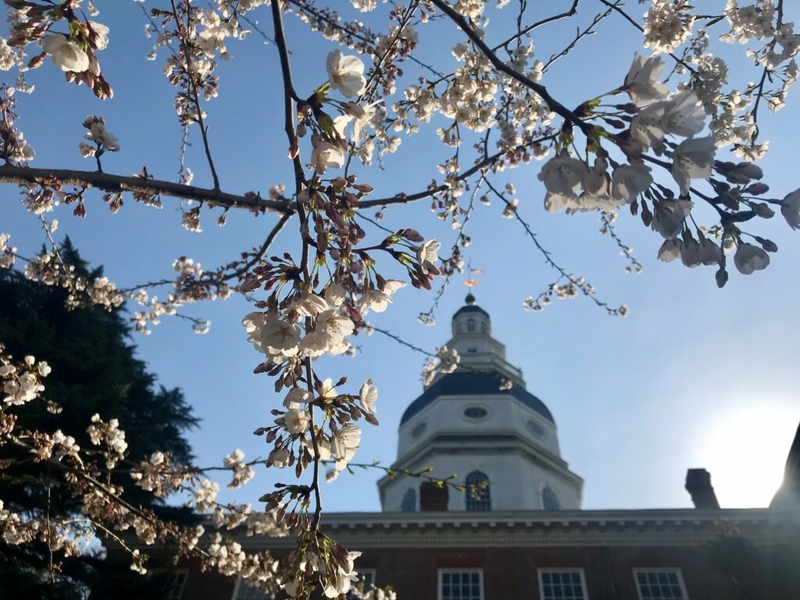Legislative roundup: Senate passes bill lifting restrictions on child sex abuse lawsuits, health subsidy and campus gambling bills advance

The Maryland Senate passed a bill Thursday that would lift legal limitations on when survivors of child sexual abuse are able to bring legal cases against their alleged abusers.
Although the Senate voted 42-5 in favor, the legislation must move over to the House of Delegates where an identical bill must be accepted so it could be signed by Gov. Wes Moore (D).
While expansions of the law have passed the House of Delegates in recent years, those bills stalled in the Senate chamber.
The legislation is under consideration as Maryland Attorney General Anthony Brown (D) prepares to release the findings of a years-long investigation into abuse by members of the clergy in Maryland, a move approved by a Baltimore City judge earlier this week.
Sen. William C. Smith Jr. (D-Montgomery), chair of the Judicial Proceedings Committee, said he’s pleased with his colleagues in supporting survivors by passing the bill. He also expressed displeasure with the Catholic Church, which hasn’t supported the legislation.
“I’m Catholic. My mother is Catholic. I grew up in Catholic Church and I’m so disappointed in their position on this,” he said after a nearly three-hour floor session Thursday night. “But I’m confident that we’re on the right side of history here and that they’re on the wrong side of history.”
Senate Bill 686 repeals the statute of limitations and caps liability for governments and school boards at $890,000.
The liability limit for a single plaintiff increases to $1.5 million for claims against private institutions for non-economic damages such as pain and suffering. An amendment approved last week removes the cap for economic damages like therapy or medical treatment.
Brown (D), in a letter sent earlier last month, told lawmakers the bill was “not clearly unconstitutional,” but it is likely to end up in a legal battle. However, Brown said he could “in good faith” defend it in court.
Sen. Chris West (R-Baltimore County), who voted against the bill, in part because he believes the state Supreme Court would rule against a future civil suit.
“I took an oath to support the Constitution of the United States and the state of Maryland,” he said. “I will not vote for a bill which I believe is unconstitutional.”
Meanwhile, a House version sponsored by Del. C.T. Wilson (D-Charles) is likely to conform to the Senate bill and pass that chamber.
Wilson, a child sexual abuse survivor, has worked on this legislation for several years. In 2017, he championed a bill that increased the current age limit from 25 to 38 for someone to sue for child sexual abuse.
Kathryn Robb, executive director of Child USAdvocacy based in Philadelphia and who’s testified in Maryland several times on the bill, called its passage a “huge win for children, survivors and basic justice.”
Robb also praised Wilson.
“I do this all over the country. I have never witnessed a man as brave and strong as Del. C.T. Wilson…[it’s] really quite extraordinary,” she said. “He’s making the state of Maryland safer for children. He’s the hero in this.”
Health subsidies bill passes
The Maryland House of Delegates passed a bill that would extend for three years a program that helps low-income younger adults cover their health insurance costs.
The State-Based Young Adult Health Insurance Subsidies Pilot Program was established in 2021 and provides lower-income adults aged 18 to 34 with state funding to help cover insurance premiums.
The subsidies are allocated to reduce the maximum expected premium contribution of qualified people under 30 by 2.5%. The subsidy is progressively lowered for people over 30.
In 2022, about 45,000 people received a subsidy at a cost to the state of $13.9 million. The Maryland Health Benefit Exchange told legislative analysts that the program reduced net premiums by an average of $36 per month. Enrollment in the age group increased by 11% after the creation of the program.
The legislation will provide up to $20 million a year a year and require a report on the program’s success.
House Bill 814 passed 100-38. A Senate version of the bill could get final approval in that chamber Friday.
Earlier in the week, the House approved additional health-related bills.
House Bill 588, labeled Access to Care Act, would make it so any resident, regardless of immigration status, could enroll in the state’s Health Benefit Exchange. The new Qualified Resident Enrollment Program would benefit un-incarcerated residents who aren’t eligible for a federal premium tax credit, Medicare, or the state’s children’s health plan. The bill passed the House 100-38. A Senate version remains in committee.
House Bill 333, which would reimburse patients who paid an out-of-pocket expense of $25 or more for hospital services but may have qualified for free care, passed unanimously Wednesday and could pass the Senate on Friday.
Campus gambling bills advance
The Maryland General Assembly welcomed the start of March Madness by passing a bill that would prohibit colleges and universities from contracting with sports wagering firms that promote betting there, if the institutions make money based on the success of student participation.
The legislation, House Bill 802 and Senate Bill 620, passed their respective chambers unanimously.
The House bill, whose lead sponsor is Del. Jheanelle K. Wilkins (D-Montgomery), also would subject contracts between sports betting firms and public colleges and universities to the Maryland Public Information Act.
Legislation was introduced in both houses after an investigation by college journalists that revealed the University of Maryland and four schools in other states had entered into agreements with sports betting companies to promote wagering at college sporting events and on radio broadcasts.
Maryland and three other public schools contracted with a third-party company, which sold sports sponsorships on behalf of the respective schools. The college journalists, however, were not given access to the contracts at four of the public universities — including Maryland — because the private, third-party contract was not subject to public inspection.








